Communities who have historically experienced marginalization continue to be denied the representation, opportunities, and resources necessary to grow and thrive in the digital economy. In the wake of COVID-19, this problem has become even more critical.
Yet, there are dedicated organizations that are accelerating digital equity for their communities. Access to technology tools, and the skills to use them, can provide educational, employment, and social opportunities that can change people’s lives.
Over the past four months, Aspen Digital has been training 7 groundbreaking nonprofits – from the US, Morocco, and India – through our Digital Equity Accelerator, a collaboration with HP. In its inaugural year, this initiative helps to scale efforts to close the tech gap for marginalized and underserved populations, including women and girls; ethnic, racial, and religious minority communities; aging populations; people with disabilities; and the teachers working with these groups.
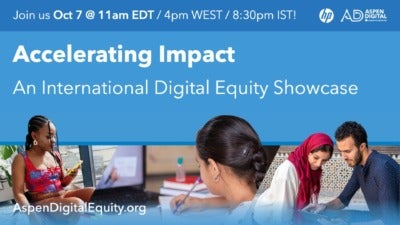
The culmination of this process will take place during a virtual showcase this Friday, October 7, at 11am EDT / 4pm WEST / 8:30pm IST. After months of hard work, the Accelerator’s inaugural cohort will present their approaches for scaling digital equity solutions. I can’t wait for the world to see what they’ve been up to.
We’ll also hear from high-level leaders dedicated to this cause, including Skoll Foundation President Marla Blow and Walmart Director of Global Culture Victor Calise.
As the clock counts down toward this major milestone, I’m excited to share more information on the incredible work this year’s cohort is doing. Read on, and get ready to be inspired!
Get to Know the 2022 Cohort of the Digital Equity Accelerator
Digital Empowerment Foundation
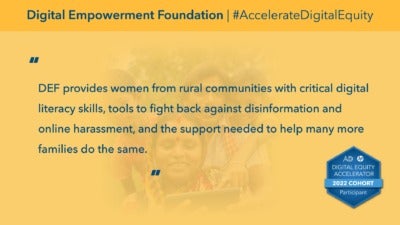
This nonprofit works across 24 states and 135 districts in India. For the last 20 years, DEF has been supporting rural women, youth, and entrepreneurs through access and infrastructure, media literacy, online security, and more.
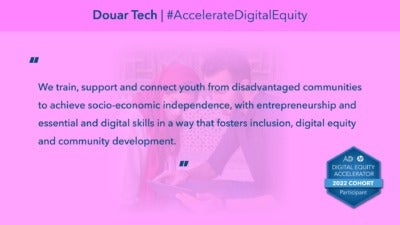
Douar Tech serves women in Morocco ages 18-35 from rural and urban-adjacent communities. They offer training in skills that are essential to thrive in a digital world, helping to foster youth and women’s empowerment.
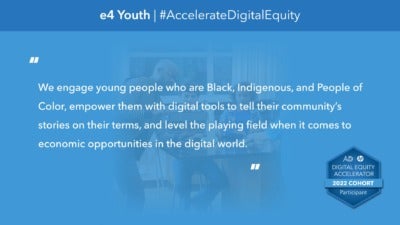
These folks support young people who are Black, Indigenous, and People of Color across Central Texas in the United States. For 15 years, they have sought to increase opportunities for their communities.
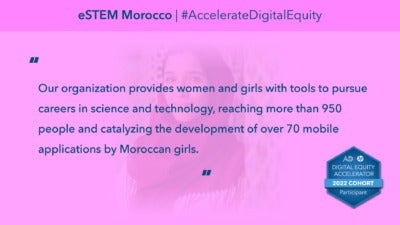
Operating in 12 regions of Morocco for almost 10 years, they encourage women as well as girls ages 8-18 to pursue education and careers in science, technology, engineering, and mathematics.
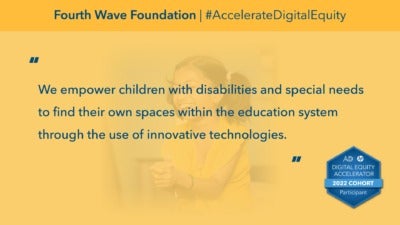
This nonprofit has been harnessing the power of technology for the last 16 years to help children with disabilities across 33 districts of Karnataka, India, thrive in their education journey.
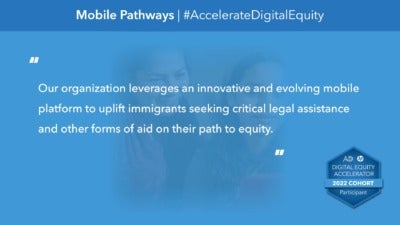
Mobile Pathways provides immigrants to the United States who have pending legal cases with access to critical services through digital technology.
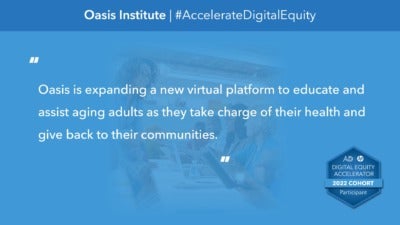
This group has helped to empower older adult learners for the last 40 years, offering technology access and education in cities across the United States.
I hope you will join us on October 7 to celebrate the impact these nonprofits are having. There’s still time to sign up, and you can learn more about the Accelerator here.
The Digital Equity Accelerator supercharges nonprofits closing the digital divide. A collaboration with HP Inc., this Aspen Digital initiative helps to scale efforts to advance digital equity for marginalized and underserved populations, including women and girls; ethnic, racial, and religious minority communities; aging populations; people with disabilities; and the teachers working with these groups.
Aspen Digital empowers policy-makers, civic organizations, companies, and the public to be responsible stewards of technology and media in the service of an informed, just, and equitable world. This Aspen Institute program shines a light on urgent global issues across cybersecurity, the information ecosystem, emerging technology, the industry talent pipeline, tech and communications policy, and innovation. It then turns ideas to action and develops human solutions to these digital challenges.
 Zaki Barzinji is a Program Director for Aspen Digital, where he oversees a range of projects at the intersection of tech, policy, equity, and justice for underrepresented communities. Zaki is a public affairs leader with a decade of experience in political campaigns, public service, and policy change at the state and federal level. He served in the White House as Senior Associate Director of Public Engagement and President Obama’s liaison to Arab-Americans, Muslims, Sikhs, and other minority faiths, where he worked to amplify voices and narratives seldom represented at the highest levels of government. Before joining the White House, Zaki served as tech policy advisor and Deputy Director of Intergovernmental Affairs for Governor Terry McAuliffe, where he helped direct the launch of Virginia’s first open data portal and managed Governor McAuliffe’s national cybersecurity initiative for the National Governors Association. Just prior to joining The Aspen Institute, Zaki worked as the head of state & local government affairs for Hewlett Packard Enterprise, where he partnered with Governors and Mayors across the country to close the digital divide, modernize tech policy, and leverage emerging technology to rebuild a more resilient and equitable digital infrastructure for all communities in a post-pandemic world.
Zaki Barzinji is a Program Director for Aspen Digital, where he oversees a range of projects at the intersection of tech, policy, equity, and justice for underrepresented communities. Zaki is a public affairs leader with a decade of experience in political campaigns, public service, and policy change at the state and federal level. He served in the White House as Senior Associate Director of Public Engagement and President Obama’s liaison to Arab-Americans, Muslims, Sikhs, and other minority faiths, where he worked to amplify voices and narratives seldom represented at the highest levels of government. Before joining the White House, Zaki served as tech policy advisor and Deputy Director of Intergovernmental Affairs for Governor Terry McAuliffe, where he helped direct the launch of Virginia’s first open data portal and managed Governor McAuliffe’s national cybersecurity initiative for the National Governors Association. Just prior to joining The Aspen Institute, Zaki worked as the head of state & local government affairs for Hewlett Packard Enterprise, where he partnered with Governors and Mayors across the country to close the digital divide, modernize tech policy, and leverage emerging technology to rebuild a more resilient and equitable digital infrastructure for all communities in a post-pandemic world.

